#sorcery and enchantments
Text
Manawydan, Son of Llŷr
“Manawydan, Son of Llŷr” is another captivating tale from “The Mabinogion,” the collection of Welsh medieval legends. The story follows the adventures and trials of Manawydan, the son of Llŷr, a powerful figure in Welsh mythology. Here’s an abridged version of the story:
After the tragic events of “Branwen, Daughter of Llŷr,” Manawydan, the son of Llŷr and brother of Branwen, returned to Britain…
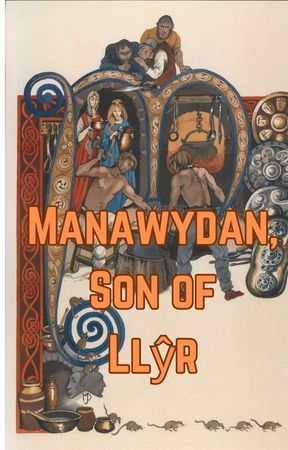
View On WordPress
#ancient legends#Celtic traditions#enchanted castle#friendship and loyalty#kingdom of Dyfed#magical spells#Manawydan#medieval Welsh culture#mysterious forces#mythical adventures#noble quests#Son of Llŷr#sorcery and enchantments#tales of perseverance#The Mabinogion#Welsh folklore#Welsh mythology#Welsh sorcerer
2 notes
·
View notes
Text

#gif#gifmovie#animation#magic#sorcery#enchantment#black magic#dark arts#dark magic#chemistry#Disney#1930s#30s#snow white#snow white and the 7 dwarfs#film
3K notes
·
View notes
Text

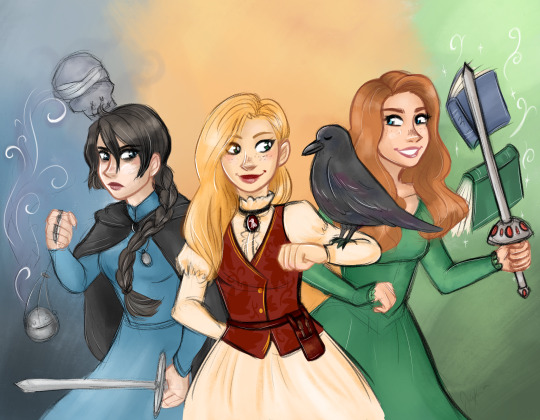
Heroines of Margaret Rogerson's books fanart!
Read these books if you enjoy a beautifully crafted writing style, worldbuilding, and characters! They are all such unique gems that have interesting distinct worlds, and I need more people to talk about them. 😂
Artemisia from Vespertine, Isobel from An Enchantment of Ravens, and Elizabeth from A Sorcery of Thorns.
#vespertine#an enchantment of ravens#a sorcery of thorns#margaret rogerson#Artemisia#Isobel#elizabeth#my art#I have too much fanart of these books stored up and I need the time to finish them XD
162 notes
·
View notes
Text

A word on Constant Effect Enchantments
We've had occasion before now to reflect how constant Illusion enchantments are detrimental to one's mental health. @theseventhoffrostfall has aptly dubbed it "the dunmer version of lead-based makeup" which also underscores how it became a kind of fashion statement, to cloak oneself in, say, cumulative Chameleon enchantments, in civil setting. The harmful effects of illusion magic ranges from insidious to truly devastating: as is the case with Sanctuary spell, shown to be the main driver of disassociative disorders—conditions that involve experiencing a loss of connection between thoughts, memories, feelings, surroundings, behavior and identity. Under these circumstances, one can imagine how even the lowliest Light spell—if made into a constant effect—would be further exasperating these symptoms.
Here I refer you to my monograph: "On pathology of indirect Light spells", Black Horse Courier Press, Imperial city.
While Reflect and Detect spells (of Mysticism school) may work towards eroding one's circumspection—the ethereality, the ghostliness of Sanctuary is an assault on faculties most fundamental.
So once again I ask you to call upon your local Council-members to vote on banning this magical mal-practice!
#elder scrolls#morrowind#tamriel#vvardenfell#morrowind lore#skyrim#oblivion#tesblr#tes lore#tes online#morrowind memes#magic#wizard#enchantment#sorcery#mage#mage class#gaming#spell#fantasy#spellcasting#tes 3 morrowind#enchanting#skyrim memes#elder scrols online#wizard problems#evil wizard#magic lore
50 notes
·
View notes
Text
I think it's interesting that when Gandalf describes Denethor's ability to "perceive, if he bends his will thither, much of what is passing in the minds of men," he ties it less to his wisdom or general insightfulness (though he possesses both) than to his difference from "other men of this time," his near total Númenóreanness, and as bolded here, the active exercise of his will.
Tolkien also attributes Denethor's resilience against Sauron (by contrast with Saruman) to not only his right to use the Anor-stone, but "great strength of will." He notes that Sauron had no servant with greater mental powers than Saruman or Denethor, and Gandalf remarks that Denethor was "too great" to be subdued to Sauron's will.
Denethor and Gandalf have a strange and unsettling silent confrontation, carried on by their gazes, yet it strikes Pippin as like "a line of smouldering fire" and "as if reading each other's mind." Gandalf afterwards says Pippin was stuck between two "terrible old men," lumping Denethor in with himself. Pippin also sees some kind of kinship between Denethor and Gandalf, as Sam saw between Faramir and Gandalf.
In his letters, Tolkien said that the ancient Númenóreans became barely distinguishable from Elves in appearance and in their powers of mind. In Unfinished Tales, he notes that they loved their horses, and when a Númenórean had a strong bond with a horse, it was said that the horse could be summoned "by thought alone."
In LOTR, Faramir—who has inherited Denethor's Númenóreanness/wizardliness—has a reputation for command over both animals and men. When everyone else is thrown by their horses upon being chased by five Nazgûl, he not only keeps his seat, but mysteriously gets his horse to ride back towards the Nazgûl. And during the retreat across the Pelennor, the soldiers in the city conclude that Faramir must be with the men who are managing to retreat in order, repeating Beregond's remark that he has some undefined command over both men and beasts.
Gandalf suggests that this is a result of Faramir pitting himself against the effects of the Nazgûl in some way, but his abilities (whatever they are) are outmatched. In the event, the effect of Faramir's Aura of Courage commanding abilities remains until he's shot and finally falls to the Black Breath.
Faramir also makes repeated references to perceiving or reading things in Gollum's mind. At one point, he describes Gollum's mind as dark and closed, yet unable to prevent Faramir from detecting that he's holding something back about Cirith Ungol specifically. Noticeably, this only happens when Faramir orders Gollum to look at him (which Gollum does "unwillingly"), and the light drains from his eyes as he meets Faramir's. It seems decidedly reminiscent of the later Gandalf vs Denethor duel-by-eye-contact.
Faramir's exact words about Gollum's secrecy are "That much I perceived clearly in his mind," in reference to his earlier questioning of him. He says that he can "read" previous murders in Gollum and Gollum cries out in pain when he tries to lie to him.
When Faramir gives staves to Frodo and Sam, he says that a "virtue" of finding and returning has been placed on them, with zero explanation of what he means by that. He adds a hope that the virtue will not altogether fail under Sauron's power in Mordor. He describes the people who did the woodwork but not who placed the virtues (it doesn't seem inherent to the wood itself, given his phrasing).
We do know that Dúnedain can potentially embed enchantments into items. The Barrow-daggers carried by Merry and Pippin are specifically enchanted against the Witch-king of Angmar by an unknown Dúnadan of the North, and when Merry stabs the Witch-king, the dagger breaks enough spells for Éowyn's ordinary sword to finish the job.
Meanwhile, Aragorn uses his healing powers to help the city, wishing for the presence of Elrond, because he is their eldest of their kind and more powerful. Aragorn, also, has at least some part of this ability to actively exercise his will and mental powers, perhaps an equal share, though he uses it less often.
In the book, he doesn't physically attack the Mouth of Sauron, but instead holds his gaze (again, eye contact is important!). There's another silent struggle that involves no weaponry or any other contact.
He prevails in some way over the Mouth of Sauron (not a warped creature of Sauron in the book, but a cruel Númenórean who has "learned great sorcery"). The Mouth indignantly says he has diplomatic immunity and can't be attacked like this.
But, I mean, maybe they're all just smart and perceptive, it's really unclear.
#eldritch dúnedain WHEN#because i am very aware that this could be deeply unsettling if presented just a bit differently!#but it is wild to me that tolkien can outright say 'this guy is a númenórean who learned sorcery'#and people are still like 'but can númenóreans use magic. i guess we'll never know.'#or have faramir give his whole speech about what gollum's mind looks like to him and what he can see clearly in it#fandom: idk it's just really unclear#gandalf: denethor can see what happens in other people's minds if he exercises his will#fandom: a great mystery ... maybe he's just very wise and insightful???#tolkien: the dúnadan who enchanted the daggers would be happy to know his spells worked and helped defeat the witch-king#fandom: númenórean craftmanship is /skilled/ of course but how can we make this about elves#honestly it seems like people don't /want/ númenóreans to have supernatural abilities and i'm not sure why#humans who have elvish-style powers and appearance yet can never escape their humanity is SUCH a concept#(yes i will harp on this until the end of time)#anghraine babbles#legendarium fanwank#legendarium blogging#long post#húrinionath
406 notes
·
View notes
Text

The Magician by Léo Schnug
#léo schnug#art#magician#magicians#history#europe#european#sorcery#magic#esoteric#enchantment#spells#wizard#wizards#enchanter#sorcerer#supernatural
213 notes
·
View notes
Text

Watercolour inspired by the book Vespertine by Margaret Rogerson ❤️ I’ve only read the first couple of chapters and it’s already so atmospheric and enchanting, I can’t wait to see where the story goes.
#vespertine#margaret rogerson#fanart#watercolor#an enchantment of ravens#sorcery of thorns#the revenant#artemisia
61 notes
·
View notes
Text
hazel and annabeth are both women in stem but like. different sides of the stem spectrum
#annabeth: science tech engineering math#hazel: sorcery thaumaturgy enchantment magic#hazel levesque#annabeth chase#happy talks pjo#this is also walt and leo lmao
36 notes
·
View notes
Text

#SWORDTEMBER DAY 15: ENCHANTER
#animation#artists on tumblr#black and white#swordtember#swordtember 2023#comic book art#swords#fantasy#sword and sorcery#animation art#wizard#magic#enchanter
21 notes
·
View notes
Text
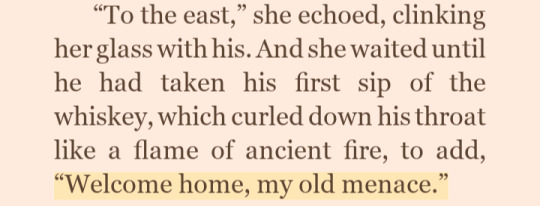


Much to think about...
A River Enchanted (Elements of Cadence #1) - Rebecca Rose
Sorcery of Thorns (Sorcery of Thorns #1) - Margaret Rogerson
The Queen of Nothing (The Folk of the Air #3) - Holly Black
#a river enchanted#elements of cadence#rebecca ross#sorcery of thorns#margaret rogerson#the folk of the air#holly black#tfota spoilers#words words words
139 notes
·
View notes
Text
Finished An Enchantment of Ravens by Margaret Roberson. Had a very interesting take on the fae and their relationship with human Craft. It was the most refreshing take on the fae I've read in a while, in which the fair folk still felt inhuman and other and couldn't lie (compared to other books where the fae just felt like regular people with some superhuman abilities)
Spoilers:
It felt like a good standalone until the very end. I felt like the ending was going for happily ever after, but honestly just felt like it was a happily for now ending. Isobel becoming Queen of the Fair Folk was odd considering how much she still hated fair folk in general even at the end. It was unclear whether she would be exercising any sort of real power or change (as Gadfly seemed to imply) or it's just a means to make Rook King of the Fair Folk. And while Rook and Isobel will no longer be put to death for loving each other, there's nothing to suggest she isn't going to age and die in a normal lifespan, while if Rook becomes like the Alder King he'll have a lifespan even crazy long for immortals. While I very much loved Isobel's practical nature, I got the impression at the end that in about 10-20 years later she's gonna break things off with Rook, which while perfectly practical is not the love story I got the impression the book was going for. And again, kinda surprised that a standalone ends with our mortal heroine becoming Queen of the Fair Folk with no follow up on that very intriguing premise.
Overall did enjoy it, and am planning on checking out her other book A Sorcery of Thorns. Oh and lowkey disappointed never learned Isobel's true name
8 notes
·
View notes
Text

My perfect shelf 🥰
Under the Moonlit spell, I concoct my own magic, swirling potions of enchantment. Each drop whispers secrets of the arcane 🌙✨
#witchy adventures#brewing#magic#magick#witchywonders#spellbound#sorcery#enchanting#witchcraft#dark academia#moonlit magic#witchy#mysticalpotions#wandering witch#PotionMasters#CharmeCraze#Wichy vibes#spellcasting sorcerer#mystic alchemy#witchy glam#enchanting moment#witchy wonder#witch craftiness#wiccablr#witchcore#fire witch#green witch#witchblr#witch community#witches
11 notes
·
View notes
Text
🍃The dark summer aesthetic of An Enchantment of Ravens🍃
Endless summer. Too warm sunlight on wheat fields without any wind blowing through them. Deep, deep forests with sun rays filtering through the yellow leaves. Brightness and heavy warmth in the light, darkness and rotting things in the shadows. Dead leaves falling from dead trees. Old overgrown stone figures made by no one knows who guarding an evil no one remembers. Things that should not exist watching from the shadows. A silence, as heavy as the sunlight, lying above everything. And the summer king, sleeping but not dead, inconceivably ancient and impossibly powerful, who lived a life full of mistakes but without regrets. Not completely evil but so, so terrifying. Stifling sun, no sound and no movements.
#its just so well written#margaret rogerson#an enchantment of ravens#vespertine#sorcery of thorns#aesthetic#dark aesthetic#summer#summer aesthetic#reading#books
37 notes
·
View notes
Text
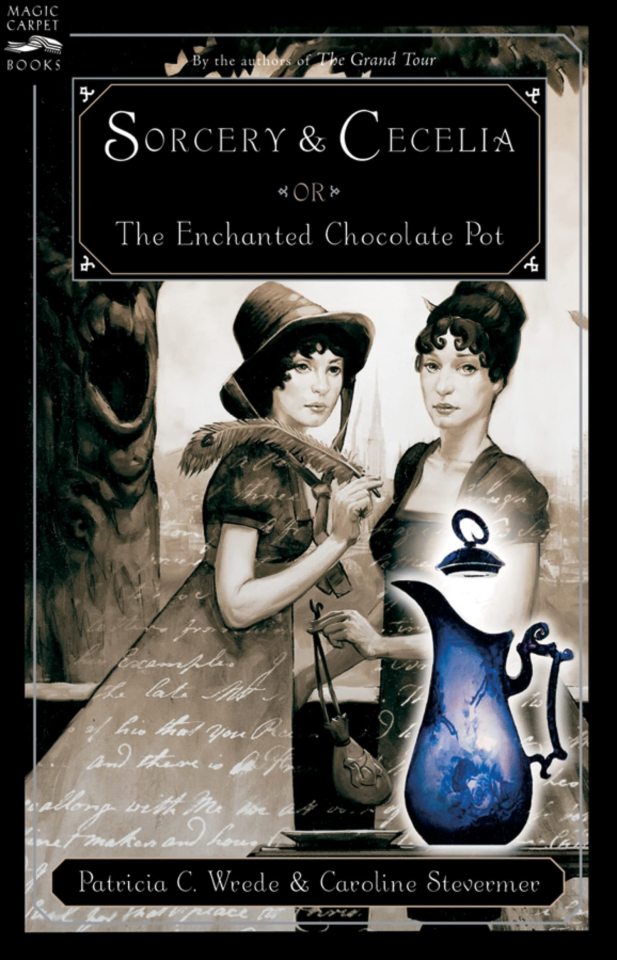
Title: Sorcery & Cecelia: or The Enchanted Chocolate Pot | Author: Patricia C. Wrede / Caroline Stevermer | Publisher: Harcourt (2004)
11 notes
·
View notes
Text
Casting Spells: The Power of Words and Beliefs
Shaina Tranquilino
January 28, 2024

Words are powerful. They have the ability to shape our reality, influence our thoughts, and impact those around us. Just as ancient sorcerers used spells to manifest their desires, we too can harness the same power through the words we speak and the stories we tell. By consciously shifting our narratives from lack to abundance, victimhood to empowerment, and complaint to gratitude, we become alchemists casting beautiful spells that attract positive experiences into our lives.
1. From Lack to Abundance:
The first step in casting beautiful spells is transforming our perception of scarcity into one of abundance. Instead of dwelling on what we lack, focusing on abundance opens doors for opportunities and possibilities. By affirming statements like "I always have enough," "The universe provides for me abundantly," or "Opportunities flow effortlessly towards me," we begin to reprogram our subconscious mind and invite prosperity into our lives.
2. From Victim to Empowered:
Playing the role of a victim disempowers us and restricts personal growth. However, by embracing a mindset of empowerment, we tap into our inner strength and resilience. Our words hold immense power in this transformational process. Affirmations such as "I am in control of my own destiny," "I possess all the resources I need within me," or "Every challenge is an opportunity for growth" help us shift from victimhood to empowerment. As we believe these statements, they act as spells that empower us with confidence and determination.
3. From Complaint to Gratitude:
Complaining breeds negativity while gratitude cultivates positivity and attracts more blessings into our lives. When we complain about circumstances or people, we unknowingly invite more reasons for dissatisfaction. By consciously practicing gratitude in both thought and speech, we transform complaints into appreciation for what is already present. Expressions like "I am grateful for every lesson life offers me," "I appreciate the love and support I receive daily," or "Thank you for this beautiful day filled with endless possibilities" become spells that manifest joy, contentment, and abundance.
4. Casting Beautiful Spells:
Once we have shifted our own stories from lack to abundance, victimhood to empowerment, and complaint to gratitude, we can then extend these beautiful spells to others. Our words carry energy and intention that can influence those around us. By consciously speaking positively about others, acknowledging their strengths, and encouraging their growth, we cast spells of inspiration and upliftment. The ripple effect of these beautiful spells can create a harmonious environment where everyone thrives.
The power of words cannot be underestimated; they possess the ability to shape our reality and attract more of what we believe. By shifting our personal narratives from lack to abundance, victimhood to empowerment, and complaint to gratitude, we cast beautiful spells that transform our lives for the better. As we speak positively about ourselves and others, our words become catalysts for change, empowering not only ourselves but also those who come into contact with them. Let us remember the incredible power within our voices and use it wisely as we embark on a journey of intentional living through casting beautiful spells.
#casting spells#words have power use them wisely#words have power#word power#spell casting magic#believe in magic#magical words#enchanting spells#manifestation magic#spellcrafting#spelling#power of belief#witchy wisdom#magical language#spell bound#manifest your desires#sorcery of speech#believe and achieve#chanting charm#spell casting 101#manifest your reality#language of magic
4 notes
·
View notes
Text
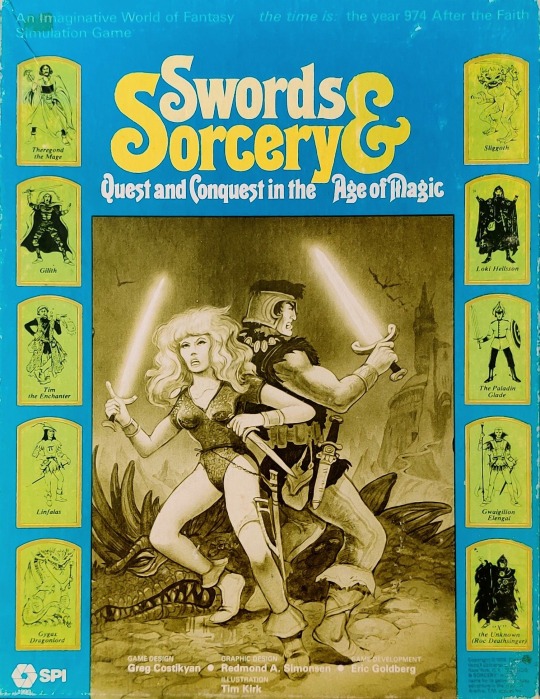
Tim Kirk’s box art for the first printings of Greg Costikyan’s Swords & Sorcery, SPI, 1978. The game was known for its use of puns and in-jokes for the names of many of its characters, locations, and spells — including “Tim the Enchanter” and “Gygax Dragonlord” seen on the cover. Some characters like Loki Hellsson and X the Unknown are mentioned in Ares 5 and SPI’s 1980 Citadel of Blood, and Linfalas with his pi logo also appeared in some art from that game.
#Swords & Sorcery#Tim Kirk#Greg Costikyan#SPI#dragon#fantasy RPG#board game#Tim the Enchanter#gratuitous monty python reference
99 notes
·
View notes